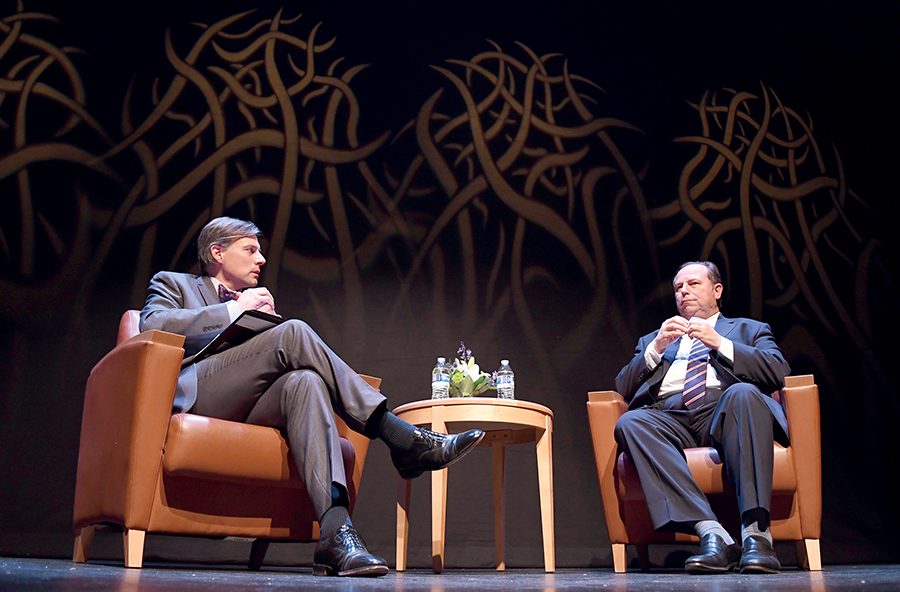Christopher Ruddy discusses state of journalism, Trump administration
November 14, 2017
Christopher Ruddy, founder and CEO of Newsmax Media Inc., discussed his career in the media and friendship with President Donald Trump during his appearance that was met with a silent protest at the Pittsburgh Playhouse last Wednesday.
The second installment of the Center for Media Innovation’s (CMI) TalkBack Series was designed to feature Ruddy not only as a figure that fits the description “media pioneer,” but also as someone who is close to the president.
Director of the CMI Andy Conte moderated the Q&A session later in the event when the audience could play an active role in the presentation and “talk back.”
Students could submit a question by writing one on a card and handing it to an usher or by tweeting one with the hashtag #MediaPioneers. Everyone in attendance was given two blank cards and a pen for this purpose.
Much of the second half involved Ruddy’s experiences with Trump, a friend he’s “known for 20 years and known very well for ten.” He recalled meeting Trump due to the geographic location of Newsmax in West Palm Beach, Fl., where the two are known to play golf.
According to Ruddy, Newsmax is not “ideologically driven” despite having an “ideological perspective,” this being “center-right.” The digital media site is a source for news, politics, health and finance that primarily reaches a baby boomer audience, Ruddy said in the presentation.
“My mantra as a journalist is that journalism is a very basic bulwark of a democracy,” Ruddy said.
The first portion of the event addressed the current state of journalism. Ruddy discussed a saturated digital media environment, media monopolies and fake news.
“Everybody has their view [on fake news,]” Ruddy said. “Everybody’s interpreting it the way they’d like.”
Ruddy, however, championed a free press, calling it a concept currently being challenged by media consolidation efforts. The shared goal of a free press forms a “common ground between Democrats and Republicans,” he said.
One attendee asked how Ruddy can defend free press when the president attacks it.
“[Trump] loves the press,” Ruddy said. “I think he doesn’t like when the press attacks… if you attack, you give [the press] credibility, but it’s in his nature to punch back.”
Ruddy reiterated multiple times throughout the presentation that Trump does not hate the press.
Another audience member asked if there are any unbiased media outlets.
Ruddy said he likes bias and defended the use of it in the media by referencing a liberal paper from his hometown where “everything had a label and you understood when you read it.”
“I knew where they were coming from so it didn’t skew my view,” Ruddy said.
Outside of the theater, the silent protestors hung a sheet near the box office that read “hate speech is not free speech.” They also set up a table in the lobby making t-shirts in protest of the event.
The group was unable to hang the sheet off of the theater’s balcony as originally intended because they were told it was a fire hazard, according to one of the protest’s leaders, Princess Winder, a sophomore stage management major.
“When he got out we agreed we’d just stand and put our fists up,” Winder said. “I feel as though [the event] was censored very heavily. A lot of our questions did not get answered.”
Brennan Burke, a junior sports, art and entertainment management major and president of the Young Americans for Liberty Club, was glad Point Park hosted Ruddy.
“I felt like he did a good job acknowledging any biases,” Burke said. “I hope we have more events like this… left or right.”


















